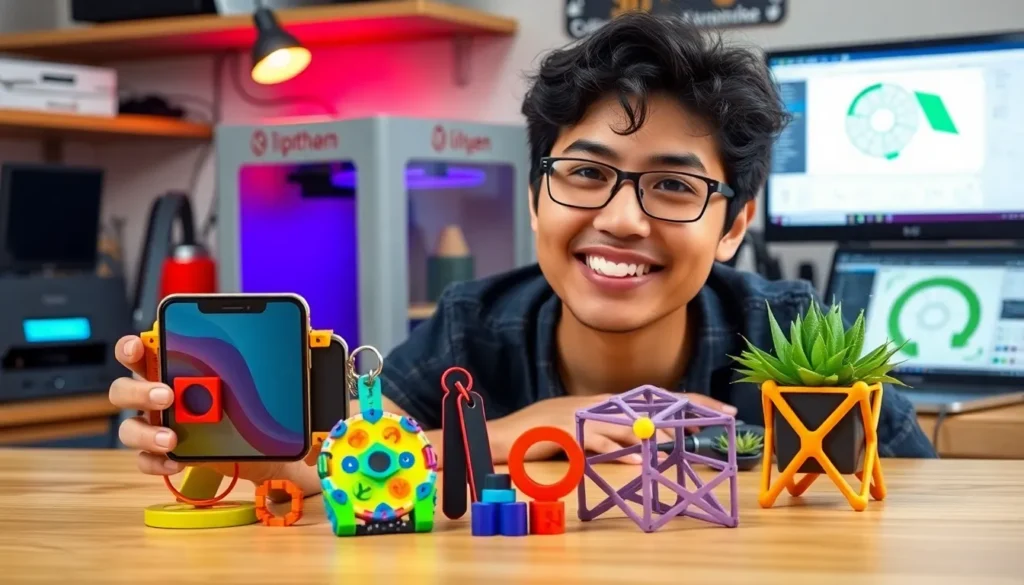Table of Contents
ToggleIn a world where Netflix can keep you glued to the couch for hours, self-improvement might seem like a Herculean task. But what if leveling up your life could be as simple as binging your favorite show? Spoiler alert: it can! Self-improvement isn’t just about meditating on a mountaintop or running marathons; it’s about making small, impactful changes that can turn a mediocre day into a masterpiece.
Imagine transforming your mornings from chaotic to calm, or your mindset from negative to unstoppable. Whether it’s mastering the art of time management or learning to embrace failure like a long-lost friend, the journey of self-improvement is filled with surprising twists and plenty of laughs. So buckle up! It’s time to dive into the world of personal growth and discover how a few tweaks can lead to a life that’s not just lived, but truly enjoyed.
Understanding Self Improvement
Self-improvement focuses on making incremental changes that enhance the quality of life. It opens the door to personal growth through various methods and techniques.
Definition of Self Improvement
Self-improvement refers to the conscious effort to enhance one’s own life skills, mindset, and overall well-being. This process encompasses various activities such as reading books, pursuing hobbies, and attending workshops. By building self-awareness and developing new habits, individuals can foster a sense of fulfillment. Seeking personal development often involves setting achievable goals and reflecting on progress. People engage in self-improvement to cultivate better relationships and increase personal happiness.
Importance of Self Improvement
Self-improvement plays a crucial role in achieving personal goals and reaching one’s fullest potential. Engaging in self-development enhances confidence and resilience, providing tools to face challenges effectively. Positive changes in mindset can lead to better decision-making and healthier relationships. Individuals benefit from adopting a lifelong learning attitude, which encourages adaptability in an ever-changing world. Stress reduction and increased motivation often result from small, consistent changes, making self-improvement essential for a fulfilling life.
Strategies for Self Improvement

Self-improvement requires actionable strategies that promote growth and development. Implementing effective techniques can facilitate meaningful change and enhance overall well-being.
Goal Setting Techniques
Begin by identifying specific, measurable, achievable, relevant, and time-bound (SMART) goals. Prioritizing goals helps maintain focus and motivation. Break larger goals into smaller tasks to create a manageable roadmap toward success. Writing down goals acts as a tangible reminder, reinforcing commitment. Regularly reviewing progress ensures continuous improvement and adjustment when necessary. Tracking milestones provides a sense of accomplishment, fostering further motivation.
Developing Positive Habits
Establishing positive habits forms the foundation for self-improvement. Start small by introducing one new habit at a time to avoid overwhelm. Consistency leads to lasting change, as habits take time to form. Setting reminders can help integrate new habits into daily routines. Surrounding oneself with supportive individuals strengthens commitment to positive behaviors. Rewarding progress encourages continued effort and reinforces the desire for growth.
Tools and Resources for Self Improvement
Accessing the right tools and resources significantly enhances personal growth. Utilizing effective materials can streamline the self-improvement journey.
Books and Literature
Books play a pivotal role in self-improvement. They provide strategies and insights that aid in personal development. Titles like “Atomic Habits” by James Clear emphasize habit formation, while “Mindset” by Carol S. Dweck explores the power of a growth mindset. Learning from these authors fuels motivation and encourages reflection on personal experiences. Literary works can transform perspectives and foster new skills. Engaging with self-help literature enriches knowledge and offers actionable advice.
Online Courses and Workshops
Online courses expand access to valuable learning experiences. Platforms like Coursera and Udemy offer diverse options, from time management to emotional intelligence. Workshops conducted by experts facilitate interactive learning and practical application. Participating in webinars and virtual events keeps individuals informed about the latest self-improvement techniques. Many resources encourage collaboration, allowing learners to connect with peers for support and motivation. Quick access to targeted courses can drive immediate progress in personal development.
Challenges in Self Improvement
Self-improvement presents various challenges. Recognizing these obstacles helps individuals prepare for their journey.
Overcoming Procrastination
Procrastination often hinders progress. Identifying triggers can enhance awareness and lead to better choices. Setting timers for focused work sessions increases productivity. Breaking tasks into smaller, manageable parts reduces overwhelm. Using accountability partners provides encouragement to stay on track. Celebrating small achievements reinforces motivation and creates a positive cycle.
Dealing with Setbacks
Setbacks are part of the self-improvement process. Acknowledging emotions associated with failure fosters resilience. Learning from mistakes provides valuable lessons for future efforts. Maintaining a flexible mindset helps individuals adapt to new situations. Reassessing goals allows for realignment with personal values, ensuring continued relevance. Seeking support from mentors and peers creates a network of encouragement.
Embracing self-improvement is a journey filled with potential and excitement. By making small changes and setting achievable goals, individuals can transform their lives in meaningful ways. The process encourages a positive mindset and fosters resilience, enabling better decision-making and healthier relationships.
With the right tools and resources, such as insightful books and engaging courses, anyone can enhance their personal growth. It’s essential to recognize obstacles and setbacks as part of the journey, learning from them while maintaining a flexible approach.
Surrounding oneself with supportive individuals further strengthens commitment to this lifelong endeavor. Ultimately, self-improvement is not just about reaching goals; it’s about enjoying the process and becoming the best version of oneself.










